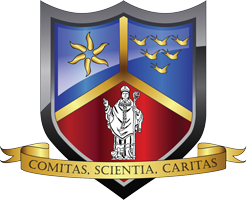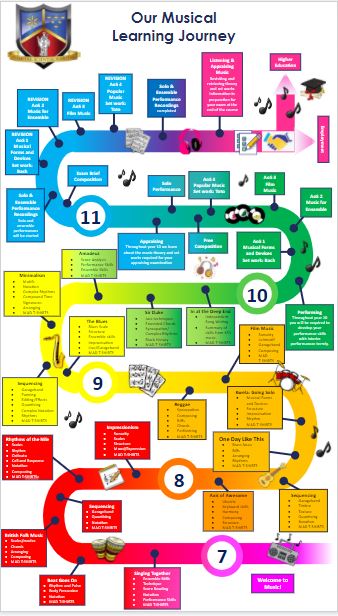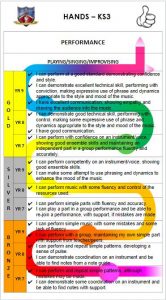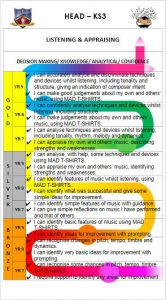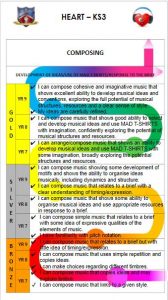Music
Meet the department
- Mrs Byrne – Subject Leader of Music
- Mrs Potter – Teacher of Music
INTENT
Music is central to every pupil’s experience at St Richard’s, and has the potential to enrich their lives enormously. There are three main strands to their experiences:
- In the classroom
- The extra-curricular programme
- Supporting the Faith ethos of the college
Our focus in the music department is to ensure each and every pupil leaves St Richard’s Catholic College with a lifelong love of music. Pupils will be independent, confident, risk-taking learners who are motivated and enthused by all aspects of the curriculum. We aim to instill this passion through a diverse, creative, engaging curriculum and through the outstanding vocal and instrumental opportunities that our enrichment and peripatetic programme provides. Pupils will develop their instrumental and vocal abilities outside of the classroom through weekly assemblies, services and masses. We will also encourage all pupils to develop their confidence/self esteem and performance skills by participating in music concerts, school shows/musicals, choral singing at Westminster Cathedral/ Arundel Cathedral and regular appearances at the De La Warr plus many more.
Critical thinking is crucial to the musical development of every pupil. We encourage pupils to distinguish between musical styles and genres and to have a solid and deep understanding of the history, context and musical dimensions.
Performance (Hands) Composition (Heart) and Listening/Appraising (Head) are at the very core of our curriculum.
IMPLEMENTATION:
Music is divided in three components:
1: Performing 2: Composing 3: Listening/Appraising
These three components are evident in all areas of our KS3/KS4 curriculum.
In KS3/4 we like to keep our lessons as practical as possible and ensure that all pupils have an opportunity to perform in front of the class or a smaller audience to receive constructive feedback. The practical nature of the lessons encourages them to be independent learners and they often use detailed, differentiated resources to enable development in the classroom.
Pupils in KS3 follow a diverse, creative and engaging curriculum that covers a range of topics including:
Year 7
- Singing Together (Induction Mass preparation/score reading/Musical dimensions)
- Beat Goes On (Rhythm/Texture//Note Values)
- Folk Music (Scales/Modes)
- Sequencing 1/Fat Boy Slim (Music Technology/arranging)
- Rhythms of the Nile (Arabic Scale/World music)
- Impressionism (Debussy/ Classical music/History and periods of music)
Year 8
- Kwela – Going Solo (Improvising and understanding structure/Rondo form/world music)
- Sequencing skills 2 (Seven Nation Army/Music technology/Arranging)
- Oh When the Saints (Whole Class Brass/Arranging)
- Popular Music
- Film Music (Performing)
- Reggae (Rhythm/Off-beat/History of Reggae/World music)
Year 9
- The Blues (Context of the Blues/Ensemble skills, improvisation)
- Sequencing skills 3 (Viva La Vida/Music Technology/Arranging)
- Minimalism (Tubular Bells/Composition/Notation/20th Century Music)
- Amadeus (Score Analysis and Performance Skills/ Western Classical Tradition)
- Film Music (Composition)
- In at the Deep End (Working in bands to produce and arrange a piece of the pupils’ choice by ear/Musical Futures approach/Composition).
Pupils have access to a wide range of classroom instruments including Pbones, Pcornets and Ptrumpets, ukuleles, guitars, electric guitars and basses, keyboards, djembe, samba drums and varied percussion as well as music technology. We encourage pupils specialising in particular instruments to include these in their classroom work too.
All of these topics are related to the GCSE Areas of Study at KS4. This prepares all of our pupils for GCSE level.
KS4
GCSE music is presently a two year course, and we follow the EDUQAS syllabus. The course has 3 main components:
COMPONENT 1 :
Performing: 30%
1 x solo
1 x ensemble
Total 4-6 mins
COMPONENT 2 :
Composition: 30%
1 x Free Composition
1 x Exam board set a brief which you have to respond to
Total 3-6 mins
COMPONENT 3 :
Listening paper: 1hr 15mins
This is based on:
- AoS1: Musical Forms and Devices
- AoS2: Music for Ensemble
- AoS3: Film Music
- AoS4: Popular Music
You have 2 set works to study in great detail:
- Bach: Badinerie
- Toto: Africa
We use differentiation/adapted learning in all lessons regularly to ensure that every pupil can access the curriculum confidently.The classroom displays are crucial and most definitely support all pupils with important keywords and visual prompts to aid their knowledge and understanding. We colour code our chords and notes to support our pupils. C D E F G A B C
As teachers we attend as many CPD sessions as we can to enhance and develop our curriculum and increase our knowledge and understanding of current and new initiatives such as music technology, virtual learning etc. We attend a music hub run by East Sussex Music which enables us to network and share resources with other music teachers in the county.
We acknowledge and promote workshops and community events outside of the classroom and have delivered summer schools/ half term workshops. Many more of these kinds of activities are advertised through our website, newsletter and flyers. We will always email any interesting concerts, shows, workshops to parents via edulink.
IMPACT:
- The majority of our assessments are based on practical work and these are always videoed and stored in classroom evidence folders on the GoogleDrive
- Pupils self and peer assess the performances using excellent oracy skills and subject specific keywords (Mad T Shirts)
- Recall and retrieval games, tasks, quizzes, google forms to assess knowledge and understanding
- Frequent use of whiteboards to assess understanding
- Baseline Test in KS4
- Pupils will provide confident performances in assemblies concerts/liturgies/musicals etc
- Pupils will take ABRSM, LCM, Trinity and Theory exams outside of school
- Pupils attend music festivals and auditions outside of school
- Pupils achieve a high level of success at GCSE standard examination
Our Musical Journey from Years 7-11
About US
Pupils tell us that they really enjoy their involvement in music at St Richard’s, whether through singing, playing a range of musical instruments in our well-equipped department, joining choir, orchestra, our other numerous after school/lunchtime activities, or becoming involved in music for a Liturgy. The music area is a busy, thriving and exciting place to be, and we do everything we can to make pupils feel welcome and valued, whatever their musical interests.
We enjoy a reputation within the county, and beyond, for the high quality performance opportunities we offer all pupils and work collaboratively with the other departments and the Performing Arts team towards our end of year production which involves over a hundred pupils.
We have strong links with Create Music, as well as independent specialist instrumental tutors, and through this, pupils can receive instrumental or vocal lessons in school. We have collaborated with Create Music and are extremely fortunate to be able to host the Hastings Music Centre here at St Richard’s on a Saturday morning. This has raised our profile as a music department and will encourage more pupils from our school and the surrounding areas to get involved with the ensembles that HMC offers.
Studying music is a gateway to a lifetime of enjoyment and life-enriching creativity, and there are many and varied career paths for pupils who gain a GCSE qualification in the subject; these opportunities include performing, composing, teaching, recording, studio engineering, sound design for film and theatre, music journalist and music therapist, to name but a few. Pupils who study music develop many key skills, making them an attractive proposition for potential employers!
Celebrating our successes
As a department we are always rehearsing for a performance (usually several at the same time!), and this hard work consistently leads to outstanding results. Parents, pupils and colleagues throughout the county regularly tell us that they want their children to be at St Richard’s when they see and hear our pupils working at such high performance levels. We are constantly striving to build on our success because we want our young musicians to have musical experiences that will shape the rest of their lives in some way.
We are also delighted that our GCSE music pupils not only achieve outstanding results but make great progress in terms of their musical and personal development. In 2018 we were recognised by the Incorporated Society of Musicians for producing the top 8% of results in the country. Here are our most recent achievements for GCSE music.
| 2021 GCSE results | 2022 GCSE results | 2023 GCSE results |
| 100% 9-4
50% 7 and above |
100% 6 and above
81% 7 and above |
100% Grade 5-9
56% Grade 7-9 19% Grade 9 |
KS3 Music
To fully understand music we need to be able to make music; this is at the heart of our music department ethos here at St Richard’s and forms a firm foundation for our pupils to grow and develop. We learn music best when it is relevant to our lives and is made and experienced alongside people we enjoy working with. Rather than focus on what grade a piece of work might achieve, we are determined to focus on what skills we are developing, how expressively we are playing and what we can do musically to improve our work. Our assessment framework encourages pupils to reflect on their work in relation to performing and composing and their knowledge and understanding of it. We discuss our work in terms of working towards, meeting and exceeding our aims: EMERGING/DEVELOPING/SECURE/EXCELLING.
Our KS3 scheme of work is designed so that all of the work builds towards the requirements to be able to study music at Key Stage 4. The units of work can all be connected in some way to the music covered in the EDUQAS GCSE in Music.
Year 7
- Singing Together (Induction Mass preparation/score reading/Musical dimensions)
- Beat Goes On (Rhythm/Texture//Note Values)
- Folk Music (Scales/Modes)
- Sequencing 1/Fat Boy Slim (Music Technology/arranging)
- Rhythms of the Nile (Arabic Scale/World music)
- Impressionism (Debussy/ Classical music/History and periods of music)
Year 8
- Kwela – Going Solo (Improvising and understanding structure/Rondo form/world music)
- Sequencing skills 2 (Seven Nation Army/Music technology/Arranging)
- Oh When the Saints (Whole Class Brass/Arranging)
- Popular Music
- Film Music (Performing)
- Reggae (Rhythm/Off-beat/History of Reggae/World music)
Year 9
- The Blues (Context of the Blues/Ensemble skills, improvisation)
- Sequencing skills 3 (Viva La Vida/Music Technology/Arranging)
- Minimalism (Tubular Bells/Composition/Notation/20th Century Music)
- Amadeus (Score Analysis and Performance Skills/ Western Classical Tradition)
- Film Music (Composition)
- In at the Deep End (Working in bands to produce and arrange a piece of the pupils’ choice by ear/Musical Futures approach/Composition).
KS4 Music
GCSE music is presently a two year course, and we follow the EDUQAS syllabus. The course has 3 main components:
COMPONENT 1 :
Performing: 30%
1 x solo
1 x ensemble
Total 4-6 mins
COMPONENT 2 :
Composition: 30%
1 x Free Composition
1 x Exam board set a brief which you have to respond to
Total 3-6 mins
COMPONENT 3 :
Listening/Appraising: 40%
Listening paper: 1hr 15mins
This is based on:
- AoS1: Musical Forms and Devices
- AoS2: Music for Ensemble
- AoS3: Film Music
- AoS4: Popular Music
You have 2 set works to study in great detail:
- Bach: Badinerie
- Toto: Africa
The aims of the GCSE course are to:
- Develop candidates’ interest and enjoyment of music that will be sustained in later life, so that they are inspired, moved and changed by studying a broad, coherent, satisfying and worthwhile course of study.
- Develop candidates’ own musical interests and skills including an understanding of how to make music individually and in groups.
- Enable candidates to evaluate their own and others’ music.
- Develop understanding and appreciation and appreciation of a range of different kinds of music.
- Develop broader life-skills and attributes including critical and creative thinking, aesthetic sensitivity, emotional awareness, cultural understanding, self-discipline, self-confidence and self-motivation
Professional Practitioners/Workshops
Our work at KS4 is also enhanced by visiting musicians and composers who run workshops to develop skills essential to our work for the GCSE. We have recently had the pleasure of working with Matthew Sharp, cellist and singer, and have professional musicians from the London Mozart Players in school to inspire our orchestral musicians. We are also very fortunate to have worked closely with Polo Piatti – famous Hastings composer.
How music is assessed
KS3 Assessment
In Yr 7 and 8 we do not set any targets for our pupils in music as we believe they have no impact on the progress that pupils make. It is more important that they focus on enjoying the subject and making music. In Yr 9 we decide whether a pupil is working at Greater Depth: 7+, Accomplished: 5-6 Established: 4 or Working Towards. This is in keeping with our Bronze/Silver/Gold assessment system at KS3.
KS4 Assessment
Pupils are set an aspirational target range (the same as above) based on our own internal assessment data. Pupils are expected to achieve this grade and will be supported to do so. Past paper questions are marked according to exam board mark schemes and we regularly reflect, alongside our pupils, on how the coursework compares with and meets the exam board assessment criteria. Moderation often takes place with other schools in the area who are delivering the EDUQAS course.
The assessment of music is a complex area, as progress is not always ‘linear’; pupils make progress through a ‘spiral’ system by re-visiting and reinforcing areas of learning and moving between different strands of learning.
At KS3 we take a holistic approach to assessment taking into account the skills of:
- Performing
- Composing
- Listening/Appraising
Verbal feedback is given regularly throughout a unit of work so that all pupils can make continuous progress. Using a framework of EMERGING, DEVELOPING, SECURE and EXCELLING, we focus on what it is we are aiming to achieve and how we are meeting these aims.
This is what our assessment criteria looks like for KS3:
3 main components: Performance, Composing, Listening/Appraising
Extra-curricular Music
We offer our young musicians an extensive range of extra-curricular experiences with something for everyone to enjoy. Pupils really value the welcome they receive in the music department and are aware that we do everything we can to support them on their musical journey to become confident and passionate musicians.
Our regular ensembles include orchestra and choir which includes numbers of up to 110 in the choir and 40 in the orchestra. We also offer string group, brass group, band night and woodwind. We are in the process of developing a Chapel Band too. All pupils are actively encouraged to participate in an activity or to come and practise the work that has been taking place in their weekly music lessons. The music rooms are never quiet, and in addition to the ‘formal’ ensembles we are always rehearsing for performance events and liturgies.
